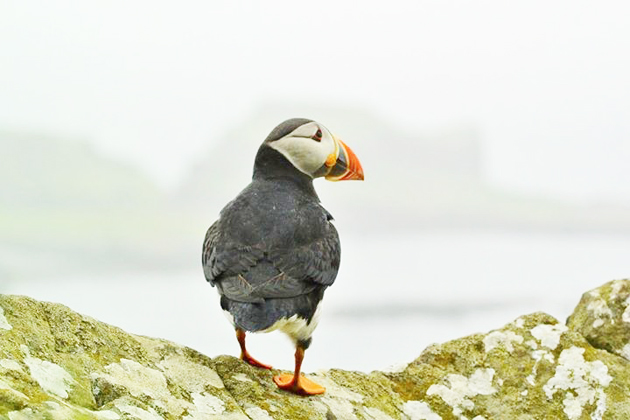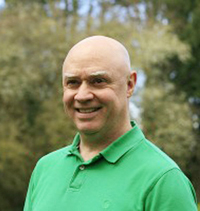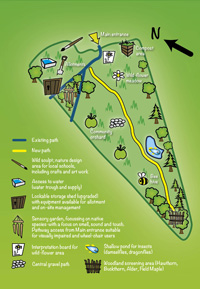“Accepting what the scientists are saying about climate change and understanding that other species have value to God, is a threat to our greedy lifestyles”, thinks David Bookless, member of environmental care NGO A Rocha.
 A puffin bird. / ARI
A puffin bird. / ARI
How should Christians think about Creation care? Have believers failed to take action in environmental issues of our time?
Evangelical Focus talked to David Bookless, member of A Rocha, an international organisation engaging in scientific research, environmental education and community-based conservation projects across six continents. The projects they devolop are based on the idea that “the gospel is for the planet as well as people.”
Bookless has written several books on theology and ecology, encouraging Christians to start acting according to the value that Scripture gives to the Earth. “Across the West, Christians, including us evangelicals, have bought into the materialism of our secular cultures, in a way that is deeply unbiblical”, he argues.
LISTEN TO THE AUDIO INTERVIEW AT THE BOTTOM OF THIS ARTICLE.
 David Bookless.
David Bookless.Question. Checking the A Rocha website one can see that you, David, are the Director of Theology of this environmental care NGO. Some may ask, what does your role involve? How do you do theology in an environmental NGO?
Answer. I guess firstly it says something about our priorities. For us, the reason why we care for the Earth is not primarily because we love nature, although we may do; it is not primarily because there is a crisis that is affecting us all, although there is. Our primary reason is because we believe that Jesus Christ is Lord of all creation.
The Earth is the Lord’s, as Psalm 24 says, and as Colossians 1 says, Christ is the one by and for whom al things were made. So for us all our work in conservation, in campaigning and environmental education comes out of our belief that the Earth is the Lord’s and that Jesus is Lord of creation.
Q. So what is your work specifically? Is it giving this vision to people?
A. Yes, I help resource the global A Rocha family. We now work in 20 countries around the world. So I help provide resources, writing blogs, provide Bible studies, I write resources for churches and I also help tackling any tricky issues that come up within the A Rocha community.
Obviously, we have a spectrum of views in Christians around the world about how creation began, about evolution and creationism, and that whole area. So we try to hold things together and say: our priority is not how God made, but why God made it and how we should care about it.
And then we have discussions about how much we can work alongside those who do not share our Christian basis. How much we can work alongside secular conservationists or other religions. And so, I try to articulate our theological thinking.
And then the second half of my role is outward facing. Trying to work with the global - particularly evangelical - community in helping bring them to an understanding of what the Bible teaches on the care of creation. So we do a lot of work with the World Evangelical Alliance, the Lausanne Movement, and some of the big international mission organisations, trying to help them integrate care for creation into all what they are doing.
Q. Rocha was born in Portugal, when was that?
A. In 1993. It was two British couples who went to Portugal to work with the Lusitanian church It’s a long story, written in beautiful book called the “Under the bright wings”. They ended up founding a field studies centre down in the Algarve to help protect a space that was beautiful, important for wildlife, but was threatened by development. So it all began then, A Rocha has been for a long time under Portuguese leadership, but it is working now, as I said, in about 20 countries around the world.
Q. To which degree can human beings really influence the ecosystems for good and help to their sustainability?
A. Well, I think we can. There is very clear evidence that we are affecting ecosystems for bad. And surely therefore that means we have the power to turn that around. One of the interesting things I found that my secular friends are saying is that, although they have and ideology that says that human beings are no more special than an earth worm or a butterfly or anything else, that we are just one randomly evolved species, from and atheistic point of view; yet they recognize that humans have huge power.
We have power to use our potential, our intelligence, our technologies, either in a way that harms the rest of nature or in a way that improves it and that lives in balance with it.
That is where we have to focus our energies, into making sure we live in a more sustainable way.
Q. You said you have a biblical worldview, a theology about Creation. Can you give an example of how understanding all this affects the day-by-day life of a believer who is living, for example, in a city?
A. Yes, I live in a city myself. To tell you something very practical it would have to do with shopping for food. I try to make shopping part of my spiritual discipline. Just like praying or reading the Bible.
So, if I am walking around the supermarket, I would image in I am walking around with Jesus beside me, and the question is ‘what would Jesus buy’. Today we are face to a ridiculous amount of choices, there are a hundred different kinds of margarine and butter that we can choose from. But the question about how has this been produced, what has the effect been on other creatures, what has the effect been on my poorer neighbor. Looking at issues like fair trade, issues of how food is produced in terms of the carbon footprint, in terms of the kind of chemicals and pesticides used. I try to buy food that is produced in a way that it actually does not increase humanity’s footprint in a harmful way on nature, rather allows creation to thrive in a more integrated way. That would be part of our food shopping.
For us, as a family, for instance, that meant that we now eat much less meat that we used to. We have not become entirely vegetarian, but we eat less meat, and what that means is we can then afford to buy meat that is ethically produced.
So it becomes part of our worship to eat in a way that glorifies God and recognises the value of God’s creation.
Q. There used to be many evangelicals (mostly in the USA) that would argue that all what you are saying does not make much sense. They would say climate change is just and invention and ecology is not important because as Christians we should dominate the Earth. There are less and less people who think like that but, why are there Christians who still would argue that ecology is not important?
A. It has been a real trouble sometimes, and you are right, there are less. I have been involved in this area for nearly 20 years now, and I have seen those kind of questions decrease quiet significantly. Particularly in Europe, it is still there as a minority view in the United States.
I think for some Christians it goes back to a fear of science, particularly as regards to climate change. For some Christians, ever since the theory of evolution came along, it has made a war between the Bible and science. And the idea that science is always trying to undermine God’s truth. So whatever the latest big scientific theory is, there is a lot of gut reactions, skepticism, amongst some Christians. And I think climate change is fitted into that.
But I think also - and I think this is true not only in America but across the West – that sadly as Christians, including us evangelicals, we have bought into the materialism of our secular cultures in a way that is deeply unbiblical.
Jesus has a huge amount to say about the dangers of wealth and money. He actually says more about that than about sin and salvation, in the gospels. And yet, if we accept what the scientists are saying about climate change, if we accept that other species have value to God, then it is a threat to our greedy lifestyles.
I think sometimes Christians have been looking for an excuse to reject the challenge of creation care and the environmental message, because it threatens deeply materialistic and idolatrous lifestyles.
Q. Citizens in different countries where you are working may say: ‘I am interested in what you are doing, but I do not agree with your faith and your worldview.’ How public are you about your faith? And how is your relationship with other secular NGO’s?
A. We are very clear about our faith. At the same time, A Rocha has always welcomed people who do not share our faith, to volunteer with us, to stay in our centres, etc. We have many non-Christians who are involved, for instance, students coming to do projects to some of our centres.
 An educational material produced by A Rocha.
An educational material produced by A Rocha. They come often as non-Christians, sometimes they leave as non-Christians, sometimes they become Christians. But we welcome people from any background, and are very clear about who we are, and don’t force it on people, we invite the questions.
At the more organizational level, we are, I think, still the only faith-based organisation to be a full member of IUCN, which is the world conservation congress. And there we find it quiet interesting.
There are definitely some who see religion as a problem and see a kind of atheistic secularism as the answer, but the majority of other organisations and partners have actually welcomed the involvement of faith communities in conservation.
And we have been able to organise meetings at IUCN conferences and other international scientific conferences about the contribution of faith to conservation. So we find there is an open door.
For some that is just pragmatic. They recognize that 80 per cent of the world’s population are members of one of the major faiths, and if you are going to conserve wildlife around the world, you need to talk to people in the language they will understand. So for some it is just the case of ‘this is a useful tool for conservation’.
But others are really wrestling with the deeper issues. This is a really interesting thing were many in the conservation world, they know that they love nature, they know that species are important, but they do not really have a philosophy that coherently explains why. I guess, from a Christian point of view, we do. We believe quiet clearly that value comes from God, that species have value, that ecosystems have value, simply because God values them. Because God, right in the beginning says: ‘It is good, it is very good’. Because God in the time of Noah, insisted that representatives of every species be brought into the ark. And so on, right through the Scriptures.
We have a coherent explanation of why nature has value, and this is something I think an increasing number of people in the environmental movement are searching for. So we are able to be part of those debates on quiet a serious level.
Q. Finally, tell us one reason why churches should get more involved with environmental initiatives like yours.
A. Can I give more than reason? [laughs]. The fist reason is because it is biblical. Because the very first command that Scripture gives us is to be good stewards, to have dominion - which does not mean ‘domination’, it means godly leadership – within creation. To rule over the birds, and the fishes, and the seas. Not for our own sake, but for the glory of God. So it is deeply biblical, you could say it is the first great commission in the Bible.
Secondly, I think when Christians take the Earth seriously, people take the gospel seriously. We find this in our work around the world. At this time, when the environmental crisis is one of the biggest things that occupies people’s concerns, when they see Christians doing something practical about it, firstly they are surprised because they didn’t think Christianity had something to do with this.
But they are also often encouraged and excited and there is clear evidence now, in many parts of the world, that when churches take on creation care as an active part of their ministry, it actually has an evangelistic positive outcome. People would come to that church, people would seek them out, because here is a church who is taking seriously one of the big issues of our time.
God is firstly Creator. And so it deeply connects to Christian faith. I could give many more. But those are two key reasons why I think churches should get involved.

Las opiniones vertidas por nuestros colaboradores se realizan a nivel personal, pudiendo coincidir o no con la postura de la dirección de Protestante Digital.
Si quieres comentar o